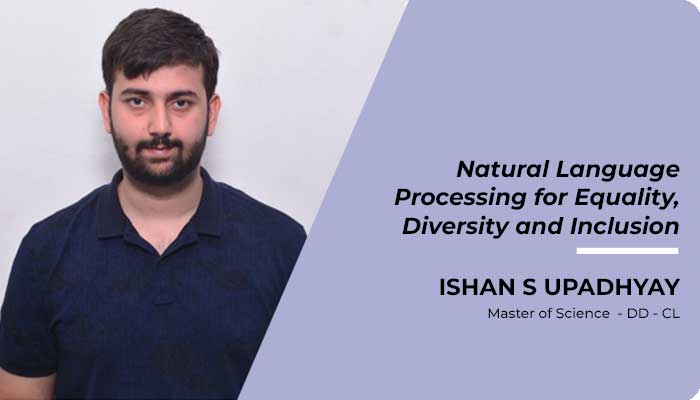Ishan Sanjeev Upadhyay received his Master of Science – Dual Degree in Computational Linguistics (CL). His research work was supervised by Dr. Radhika Mamidi. Here’s a summary of his research work on Natural Language Processing for Equality, Diversity and Inclusion:
Over the last decade, social media has experienced tremendous growth, facilitating connections between people across the globe, providing easier access to information, and offering opportunities for individuals to express themselves while joining communities of like-minded individuals. However, despite the many benefits of social media, the issue of hate speech and online harassment remains a significant problem, with approximately two-thirds of adults under 30 having experienced some form of online harassment. As a result, it has become increasingly essential to regulate social media content, and automated methods are necessary due to the sheer volume of daily content. In this thesis, we aim to address the above-mentioned problems by developing best-in-class classifiers for novel datasets. One of the approaches we take to tackle harmful online content is to adopt a positive reinforcement approach, which encourages the promotion of supportive and affirmative messages. To this end, we present a Hope Speech Detection model trained on a first-of-its-kind hope speech dataset. In the first approach, we use contextual embeddings to train classifiers using logistic regression, random forest, support vector machines (SVM), and long short-term memory (LSTM)-based models. In the second approach, we use a majority voting ensemble of 11 models obtained by fine-tuning pre-trained transformer models. Our English language model ranks first in terms of F1 score. While promoting and amplifying positive online content is beneficial, it is important to distinguish between content that is genuinely positive and content that appears positive but promotes emotional suppression. Toxic positivity, a phenomenon in which positivity is used to minimise one’s emotional experience, has become an increasing concern on social media. In our thesis, we create a dataset for toxic positivity classification from Twitter and an inspirational quote website. We conducted benchmarking experiments using various text classification models and demonstrated the effectiveness of these models for the task. Despite the many hate speech classifiers that have been trained on a general hate speech definition, there is a lack of datasets that focus specifically on homophobia and transphobia. In this thesis, we outline our approach to classify homophobia and transphobia in social media comments. We utilised an ensemble of transformer-based models to construct our classifier, which ranks first in terms of F1 score. Our approach contributes to the ongoing effort to combat hate speech and create a safer online environment for all individuals.
June 2023

